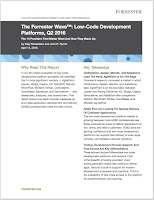SoftwareAG ha presentado la disponibilidad de MashZone NextGen Business Analytics, basada en Presto, que surgió de la adquisición de JackBe y que sustituye al original MashZone de Software AG. Incluye una funcionalidad adicional que permite a los usuarios crear interactivas y potentes visualizaciones de la información, compartir cuadros resumen y conocimiento con la posibilidad de verlos en cualquier dispositivo.
La capacidad para recopilar, supervisar, realizar cuadros resumen, analizar y comprender un flujo de información que se mueve rápidamente es fundamental para cualquier empresa digital. Llevar a cabo una analítica descriptiva, prescriptiva y predictiva o una profunda exploración de la información y visualizar esta inteligencia operativa, supone un avance revolucionario, únicamente disponible en la Digital Business Platform de Software AG. MashZone NextGen comprende un generador de paneles de control basado en HTML5 y una analítica guiada a partir de los cuales los usuarios son capaces de obtener conocimiento empleando visualizaciones a medida o creadas previamente en el marco de la Digital Business Platform.
Giles Nelson, vicepresidente senior de Gestión de Producto de Software AG sostiene que: “Los ejecutivos de operaciones y los analistas de información pueden obtener analítica en tiempo real y una amplia visualización al utilizar MashZone NextGen con Digital Business Platform. Esto les permite trabajar con más exactitud y a una velocidad que ayuda a tomar mejores decisiones en menos tiempo”.
MashZone NextGen se conecta a distintos tipos de fuentes de datos, incluyendo el almacenamiento de información compatible con JDBC, información transmitida en tiempo real de Apama, la información in-memory de Terracotta BigMemory, tablas ARIS, archivos XML, los terminales y servicios web REST y las hojas de cálculo de Microsoft® Excel®. Entre los usos característicos se incluyen: una analítica de autoservicio, analítica in-memory, inteligencia operativa, visualización de la información, conocimiento de la situación y una business intelligence en modo autoservicio.
“Las prestaciones de autoservicio en MashZone NextGen permiten a un usuario profesional crear de forma autónoma cuadros resumen sin depender del apoyo de TI. Esta autonomía se convierte en una ventaja competitiva importante para las empresas que quieren capacitar a sus usuarios para que tomen decisiones con rapidez”, apunta Giles Nelson.
MashZone NextGen es un elemento esencial dentro de la Digital Business Platform de Software AG, un set integrado de potentes tecnologías, capacidades y metodologías para gestionar una transformación digital y remodelar los diseños empresariales que permiten a la compañía extraer el máximo beneficio de la información, preocuparse más por el cliente, estar hiperconectada y ser muy ágil. Digital Business Platform está disponible en la nube, como servicio, on premise o en una configuración híbrida.




